
nlike a lot of the better-known comics, Bob Newhart has never courted controversy, used shock value to get laughs, or even so much as uttered a curse word on one of his many bestselling albums. No, Mr. Newhart's humor has always been more of the mild-mannered, buttoned-down variety – which is why his first few albums included the phrase "buttoned-down" in their titles. And although he never had the sort of zeitgeist-grabbing notoriety enjoyed by comics like, say, Andrew "Dice" Clay, well, Newhart is still selling out shows almost 50 years after releasing his debut album.
Born in 1929, Newhart grew up in Chicago's Oak Park suburb, earning a degree in business management from Loyola University before being drafted into the Army during the Korean War. He served stateside and was discharged in 1954. Newhart drifted through a few low-paying jobs – including, according to one early comedy routine, a stint as a clerk in the unemployment office where he made only $10 more a week than the people collecting benefits – while slowly making his way into comedy. Initially, he worked with a partner, recording phone routines that were aired by a local radio station, but when his partner quit, he discovered that the bits worked just as well when he did them by himself – and thus was born the first solo straight man in the history of comedy.
Though he was in his early 30s by the time his debut album (1960's The Button-Down Mind of Bob Newhart) was released, Newhart's career jumped onto the fast track once the public got a taste of his material. He became such a sensation that he swept the 1961 Grammy Awards, winning Album of the Year (for Button-Down Mind), Best New Artist and Best Comedy Performance – Spoken Word (for his second album, The Button-Down Mind Strikes Back, also released in 1960). All those years of preparation paid off with a string of successful releases over the next few years, including Behind the Button-Down Mind of Bob Newhart (1961), The Button-Down Mind on TV (1962), Bob Newhart Faces Bob Newhart (1964) and The Windmills Are Weakening (1965).
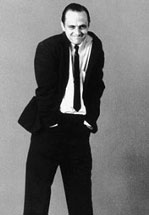 |
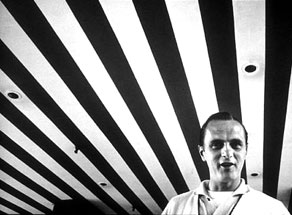 |
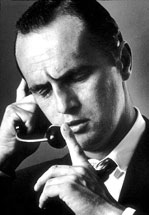 |
Of course, as popular as Newhart's routine was, it was still a shtick – and there are only so many one-sided phone conversations the market will bear. Perhaps recognizing this, Newhart started trying to move into the TV and film world early on, running a short-lived variety show for NBC in 1961 (despite its short run, it won a Peabody Award and was nominated for an Emmy) and starring opposite Steve McQueen in 1962's "Hell Is for Heroes." In 1972, he struck gold again with "The Bob Newhart Show," which ran for six successful seasons on CBS and spawned one of the greatest drinking games of all time. After "The Bob Newhart Show" ended its run, Newhart defied the odds by scoring another hit, "Newhart," which ran from 1982 to 1990, also on CBS.
Since "Newhart" went off the air, Newhart has kept a fairly low profile; although he attempted two more runs at series television (1992's "Bob" and 1997's "George and Leo"), neither caught on quickly enough to last, and for the most part, his appearances have been confined to the occasional small film role (including parts in "In & Out," "Legally Blonde 2," and "Elf") and live performances. Still, even if we miss being gifted with Newhart's timeless brand of gentle satire on our television every week, we can still catch episodes of his hit shows, which are in perpetual syndication, or give the albums another spin. Like the man himself, they've all aged quite well.
 Although it can't be said that Newhart has ever released a bad album, any collection of the man's recorded works has to begin with The Button-Down Mind of Bob Newhart (it's enshrined in the Library of Congress for a reason, people), and continue on with The Button-Down Mind Strikes Back and Behind the Button-Down Mind of Bob Newhart. From there, any album is probably as good as any other, although hearing Newhart do his classic routines all over again in The Button-Down Concert is a safe bet for any comedy fan.
Although it can't be said that Newhart has ever released a bad album, any collection of the man's recorded works has to begin with The Button-Down Mind of Bob Newhart (it's enshrined in the Library of Congress for a reason, people), and continue on with The Button-Down Mind Strikes Back and Behind the Button-Down Mind of Bob Newhart. From there, any album is probably as good as any other, although hearing Newhart do his classic routines all over again in The Button-Down Concert is a safe bet for any comedy fan.
The Button-Down Mind of Bob Newhart (1960) The Button-Down Mind Strikes Back Behind the Button-Down Mind of Bob Newhart (1961) The Button-Down Mind on TV (1962) Bob Newhart Faces Bob Newhart (1964) The Windmills are Weakening (1965) This Is It (1967) The Button-Down Concert (1997) Something Like This (2001) |
"The Bob Newhart Show" (1961) "The Bob Newhart Show" (1972-78) "Newhart" (1982-90) "Bob" (1992-93) "George and Leo" (1997) |
"Hell Is for Heroes" (1962) "Hot Millions" (1968) "On a Clear Day You Can See Forever" (1970) "Catch-22" (1970) "Cold Turkey" (1971) "The Rescuers" (1977) "Little Miss Marker" (1980) "First Family" (1980) "The Rescuers Down Under" (1990) "In & Out" (1997) "Legally Blonde 2: Red, White & Blonde" (2003) "Elf" (2003) |
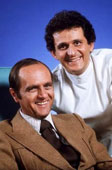 |
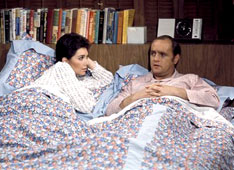 |
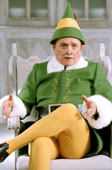 |
 |
![]() Some people wonder if it isn't unusual for an accountant to become a comedian. It's unusual for a good accountant to become a comedian. I was a very poor accountant.
Some people wonder if it isn't unusual for an accountant to become a comedian. It's unusual for a good accountant to become a comedian. I was a very poor accountant.![]()
![]() I don't like country music, but I don't mean to denigrate those who do. And for the people who like country music, denigrate means 'put down.'
I don't like country music, but I don't mean to denigrate those who do. And for the people who like country music, denigrate means 'put down.'![]()
![]() Sometimes you forget you're famous. You wonder, why is that person staring at me?
Sometimes you forget you're famous. You wonder, why is that person staring at me? ![]()
![]() The calm-delivery thing started when I was an accountant. At the end of the day, I'd be really going crazy. I had this friend of mine in advertising. I'd call him up and play a character, just to break the monotony of things. I'd call and I'd say, 'Mr. Stevenson, I don't mean to bother you, but I'm here at the yeast factory, and a fire broke out, and they sent over a bunch of fire engines and they're throwing water. I gotta run up to the second floor, 'cause the yeast is rising.' I'd just make a whole scenario, and he was the straight man.
The calm-delivery thing started when I was an accountant. At the end of the day, I'd be really going crazy. I had this friend of mine in advertising. I'd call him up and play a character, just to break the monotony of things. I'd call and I'd say, 'Mr. Stevenson, I don't mean to bother you, but I'm here at the yeast factory, and a fire broke out, and they sent over a bunch of fire engines and they're throwing water. I gotta run up to the second floor, 'cause the yeast is rising.' I'd just make a whole scenario, and he was the straight man.![]()
![]() Laughter gives us distance. It allows us to step back from an event, deal with it and then move on.
Laughter gives us distance. It allows us to step back from an event, deal with it and then move on. ![]()
![]() I think you should be a child for as long as you can. I have been successful for 74 years being able to do that. Don't rush into adulthood, it isn't all that much fun.
I think you should be a child for as long as you can. I have been successful for 74 years being able to do that. Don't rush into adulthood, it isn't all that much fun.![]()
![]() I'm most proud of the longevity of my marriage, my kids, and my grandchildren. If you don't have that, you really don't have very much.
I'm most proud of the longevity of my marriage, my kids, and my grandchildren. If you don't have that, you really don't have very much.![]()
![]() This stammer got me a home in Beverly Hills, and I'm not about to screw with it now.
This stammer got me a home in Beverly Hills, and I'm not about to screw with it now.![]()
![]() People stayed home on Saturdays to watch CBS, ... I don't know why or how the networks abandoned Saturday nights. Maybe cable has had something to do with that. I don't know, but I do know that at one time Saturdays were big for the networks.
People stayed home on Saturdays to watch CBS, ... I don't know why or how the networks abandoned Saturday nights. Maybe cable has had something to do with that. I don't know, but I do know that at one time Saturdays were big for the networks.![]()
![]() I don't know how many sacred cows there are today. I think there's a little confusion between humor and gross passing for humor. That's kind of regrettable.
I don't know how many sacred cows there are today. I think there's a little confusion between humor and gross passing for humor. That's kind of regrettable.![]()
![]() Funny is funny is funny.
Funny is funny is funny.![]()

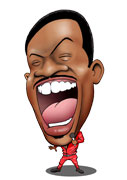 Eddie Murphy Eddie Murphy |
 Sam Kinison Sam Kinison |
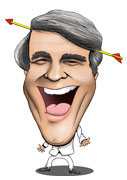 Steve Martin Steve Martin |
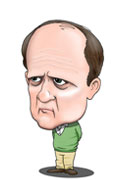 Bob Newhart Bob Newhart |
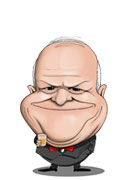 Don Rickles Don Rickles |
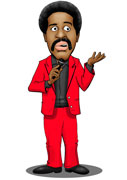 Richard Pryor Richard Pryor |
 Rodney Dangerfield Rodney Dangerfield |
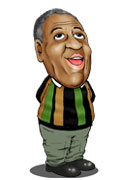 Bill Cosby Bill Cosby |
 Lenny Bruce Lenny Bruce |
 Bill Hicks Bill Hicks |






